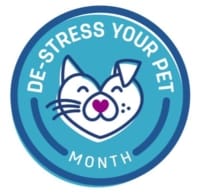April 16, 2018 – Lenexa, Kan. – Does your cat or dog hide, scratch, cry, claw or chew on the chair, or
exhibit other unwanted or destructive behavior? If so, chances are your pet is most likely not acting out of spite, but stress.
Most pet owners don’t know these unwanted behaviors are often a pet’s natural reaction to stress. Even fewer know what they can do in their home to reduce or eliminate these behaviors.
Ceva Animal Health and the American College of Veterinary Behaviorists (ACVB) are working to help pet owners recognize the signs of stress in cats and dogs as well as solutions for creating happier and healthier pets as part of De-stress Your Pet Month.
Knowing the signs of stress in your dog or cat is essential to good pet parenting. Owners may feel like they communicate on a unique level with their furry friend, but oftentimes signs are mistaken as personality quirks or even misbehavior.
“Whether the problem is a dog afraid to be left home alone or a cat scratching the furniture, pet parents often get frustrated with their pet's unwanted behaviors,” said veterinary behaviorist Dr. Valarie Tynes, president of the ACVB. “Many of the behaviors that pet owners find problematic are normal pet behavior or behaviors that arise due to fear, anxiety or stress.”
Dogs and cat both respond to stress with behaviors that are very natural ways of coping for them. Dogs tend to tremble, hide, bark excessively and pace when they are anxious or stressed. Cats tend to respond to stress with destructive behaviors such as urinating outside the litter box, scratching furniture or fighting with other cats in the household. This stress can be brought on by anything from loud noises to anxiety around traveling.
Many of these unwanted or destructive behaviors become the reason that pets, and especially cats, are relinquished to shelters, said Dr. Jane Brunt, executive director of the CATalyst Council.
“Without proper advice, people often make the problems worse by punishing their pets or inadvertently reinforcing the behavior, without realizing that there are solutions that can help with these problems,” Dr. Brunt said. “For example, pheromones for cats and dogs are a drug-free way to help your pet feel calmer and alleviate many common unwanted pet behaviors.”
Pet owners can create happier pets by providing basic essentials such as:
- Individual food and water bowls, and separate spaces to eat and drink for each member of the furry family
- A good diet based on age, activity level and formulated to reduce digestive issues or food allergies
- Comfortable bed or kennel in a quiet part of the house where the pet can relax and get away from the family from time to time
- Exercise to help burn off excess energy and tap into instinctive urges
- Classical music, a TV or radio on in the house so the pet doesn’t feel all alone or to mask scary sounds like loud engines or thunderstorms
- Toys and food puzzles to keep a pet busy. Dogs and cats are terrible multi-taskers. If they are focused and busy playing or working out a challenge for food or a treat, they won’t be as stressed out by other factors
- A scratching post for each cat
“Any time a pet owner notices behavior changes, it’s always a good idea to schedule a veterinary appointment. This will help rule out a medical condition causing the behavior or contributing to a high stress level. If our pets don’t feel well they can be perceived as acting grumpy or agitated. That is their way of telling us something is wrong,”
said Dr. Tynes.
FELIWAY® for cats and ADAPTIL® for dogs have been clinically proven to help alleviate many stress-related behaviors. These products mimic naturally occurring pheromones which give each species a sense of safety and belonging. Pheromone products are a 100 percent safe and drug-free way to calm stressed pets and help with their unwanted behaviors.
FELIWAY® and ADAPTIL® are available at your veterinary hospital, PetSmart or local pet retailer.
To learn more about how to reduce stress and anxiety in pets including the signs to look for, visit www.de-stressyourpet.com.
# # #
About the American College of Veterinary Behaviorists
The American College of Veterinary Behaviorists is the certifying body, approved by the American Veterinary Medical Association, to certify veterinarians in the specialty of clinical animal behavior. Board-certified specialists are known as Diplomates and receive extensive training in the behavioral health of animals. ACVB's mission is to advance the specialty of veterinary behavior through education, research and clinical practice. Visit http://www.dacvb.org/
Related topics: De-Stress Your Pet Month ADAPTIL Pheromones FELIWAY

 Corporate Website
Corporate Website
 Africa
Africa
 Argentina
Argentina
 Asia
Asia
 Australia
Australia
 Belgium
Belgium
 Brazil
Brazil
 Bulgaria
Bulgaria
 Canada (EN)
Canada (EN)
 Chile
Chile
 China
China
 Colombia
Colombia
 Denmark
Denmark
 Egypt
Egypt
 France
France
 Germany
Germany
 Greece
Greece
 Hungary
Hungary
 Indonesia
Indonesia
 Italia
Italia
 India
India
 Japan
Japan
 Korea
Korea
 Malaysia
Malaysia
 Mexico
Mexico
 Middle East
Middle East
 Netherlands
Netherlands
 Peru
Peru
 Philippines
Philippines
 Poland
Poland
 Portugal
Portugal
 Romania
Romania
 Russia
Russia
 South Africa
South Africa
 Spain
Spain
 Sweden
Sweden
 Thailand
Thailand
 Tunisia
Tunisia
 Turkey
Turkey
 Ukraine
Ukraine
 United Kingdom
United Kingdom
 USA
USA
 Vietnam
Vietnam


